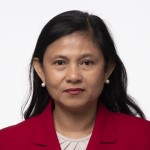Wednesday, Apr 12, 2023 | 10:30 AM - 11:30 AM
Location: Meeting Halls A&B, HQ1-3-430A&B
OVERVIEW
Join us for a panel discussion on the future of AI and its implications for the economy. OpenAI's GPT and other natural language processing tools have caused excitement and fear in the last few months. The discussion with this expert panel on AI policy experts and economists will examine how we can shape policy design to balance risks and opportunities.
MODERATOR
 |
||
Shirin Hamid |
||
Shirin Hamid is the Chief Information Officer (CIO) and Director of Information Technology at the IMF. She has more than 20 years of executive leadership in digital transformation and innovative use of information management and technologies for complex, large multinational and multi-dimensional organizations at an international scale. Prior to the Fund, Shirin was CIO at the Asian Development Bank (ADB) for 6 years, where she led major digital transformations in the organization, spanning over 30 countries. Shirin also held the role of Chief Technology Officer and Director of the United Nations Development Program (UNDP), where she worked to maximize the impact of technology on a global stage, covering 170 countries. Shirin’s work was recognized by the CIO 100 Award in 2019, 2021 and 2022. She was honored to be named as The World's 100 Most Influential People in Digital Government in 2019, Top 100 Premier Global IT Leader by ComputerWorld in 2014, as well as Asia CIO 100 Honoree Award in 2003, 2004 and 2005.
SPEAKERS
 |
||
Anton Korinek |
||
Anton Korinek is a Rubenstein Fellow at the Brookings Institution as well as a Professor at the Department of Economics and at the Darden School of Business of the University of Virginia. He is also a Research Associate at the NBER and CEPR, the Economics Lead at the Centre for the Governance of AI (GovAI), a Senior Advisor at the Partnership on AI, and an editor of the Oxford Handbook of AI Governance.
Professor Korinek’s research analyzes how to prepare for a world of transformative AI systems. He investigates the implications of advanced AI for economic growth, labor markets, inequality, and the future of our society. In his past research, he investigated the mechanics of financial crises and developed policy measures to prevent future crises, including an influential framework for capital flow regulation in emerging economies. His research has been published in the top journals of the economics profession and cited on Bloomberg, in the Economist, the New York Times, and the Wall Street Journal. He has won several fellowships and awards for this work, including from the Institute for New Economic Thinking, the Hewlett Foundation, the Long-Term Future Fund, and Longview Philanthropy.
Anton Korinek studied economics, math and law at the University of Vienna and worked for several years at the intersection of IT and finance. After earning his PhD in economics from Columbia University in 2007, he held positions at the University of Maryland and Johns Hopkins University and was a visiting scholar at Harvard University, the Bank for International Settlements, the International Monetary Fund, the World Bank, as well as a frequent visitor to many central banks.
 |
||
Murielle Popa-Fabre |
||
After an international academic career as a Natural Language Processing (NLP) Researcher and Cognitive Neuroscientist, teaching in France and in the US at Cornell, Murielle Popa-Fabre (PhD) is currently advising on AI and Human Rights related topics at Council of Europe. Her past research in Neuroimaging of Language (fMRI and EEG) at Collège de France contributed to a deeper understanding of the neural basis of languages (French, Chinese and English). Focusing on the human capacity of understanding structured patterns, she shed light on the brain areas responding to syntactic structure complexity. Always leveraging on a multidisciplinary approach to NLP, Neuroscience and Linguistics, she was awarded a prize for successfully building science and humanities interfaces. Her work in NLP at Cornell and INRIA was published in top journals of computational language processing (EMNLP, ACL, etc.), it included designing training corpora for Large Language Models (LLM) like ChatGPT, and building AI systems that partly mimic how the human brain processes languages, to forge more efficient Language Models.
Today at the Council of Europe, Murielle Popa-Fabre (PhD) analyses cutting-edge data protection pseudo-anonymization techniques based on neural networks methods to deidentify judicial decisions, and studies the possible impacts of LLM like ChatGPT on judiciary systems and decision-making processes. Passionate about Responsible AI, she brings her concrete research and technical experience to the world of AI Policy and Governance. In parallel, she actively disseminates technical understanding of Large Language Models and AI regulation to general audience, lawyers, judges, but also retail or cybersecurity professionals. She was recently interviewed in French newspapers on Neuralink’s neurotechnology devices and on ChatGPT and its impact on work and society.
 |
||
Hélène Landemore |
||
Hélène Landemore (Harvard Ph.D. 2008) is a professor of political science at Yale University, where she has been teaching political theory since 2009, and Distinguished Researcher at the Oxford University Institute for Ethics in AI since 2022. She currently sits on the governance board of the French Citizens' Convention on end of life and is a strategic advisor to the non-profit organization DemNext. She is the author of Democratic Reason (Princeton University Press 2013), Open Democracy (Princeton University Press 2020), and Debating Democracy (Oxford University Press 2021, with Jason Brennan) as well as various edited volumes and articles in democratic theory. She is currently working on a book with John Tasioulas on the ethics and politics of AI, where they examine, among other questions, the ways AI may facilitate and augment the deliberative capacities of ordinary citizens.
PHOTOS